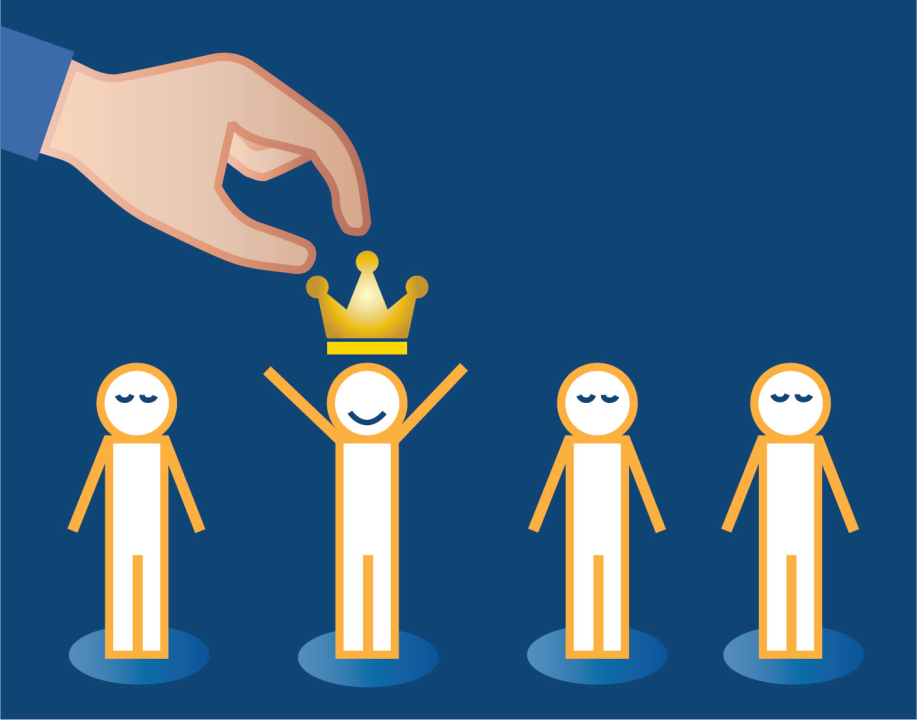
Does your colleague get special treatment from the manager while everyone else on the team gets pushed aside? Favoritism is inevitable in any workplace, as it’s a part of the human nature.
According to a report, more than 75% of employees witnessed favoritism in the workplace.
While your boss favoring someone else despite their poor performance or reviews might seem harmless or even natural in some situations, it can cause serious problems for employees and organization.
Favoritism can even lead the manager or someone in a higher position to make decisions favoring the people they like, which can have negative consequences for others.
This article will help you learn what favoritism in the workplace looks like and why it is bad. We’ll even tell you what to do if your professional life is getting affected by “favoritism.”
What is Favoritism in the Workplace?
When some employees are given preferential treatment over others by their employer or manager, it refers to favoritism in the workplace. Preferential treatment can be based on anything but often includes personal relationships, biases, or other subjective factors unrelated to job performance or qualifications.
Favoritism can manifest in different ways, such as providing better assignments, promotions, benefits, or pay raises to favored employees, ignoring poor performance, or even turning a blind eye to misconduct.
For instance, an employer might give the best tasks to their favorite employee even though other employees are equally qualified to perform them. Or a manager may promote a less-qualified employee because they are friends, while a more deserving employee is overlooked.
Some Examples of Favoritism in Workplace
Understanding what favoritism looks like is important for every employee to determine it in its early stages. Below we have compiled a list of situations that’ll help you understand whether favoritism exists in your workplace.
-
Unequal Opportunities
In such situations, the favored employees are given more opportunities to attend training sessions, conferences, or other professional development activities than others. Such employees may receive these opportunities based on their relationship with the manager rather than their merit or performance.
-
Ignoring Misconduct
Sometimes, a manager may overlook inappropriate behavior or misconduct by a favored employee, while others may be held accountable for their actions. For example, the favored employee gets away when they take a leave, while other employees receive a notice for it.
-
Unfair Assignments
If the manager consistently assigns the most interesting or challenging tasks to a particular employee while others are left with routine or menial work, it means workplace favoritism exists in your company.
The favored employee may not necessarily be the most qualified or skilled for the task but rather the manager’s favorite.
-
Extra Attention
It’s common for managers to give extra attention to some employees, and it can be based on anything, including their relations, employee performance, and more. However, when the manager overlooks other employees that don’t qualify as favorites, it plants the seed of “favoritism” in the organization.
-
Only Some Voices are Heard
In every company, there are some employees who are more vocal than others. However, if it leads to the boss or manager ignoring the employees who don’t speak much, it can result in favoritism.
For example, if your complaint about the working hours goes unnoticed, while the boss listens to the same complaint of their favorite employee and acts on it, this is favoritism.
Why is Favoritism in the Workplace a Bad Thing?
Imagine you are in a situation where an employee gets appreciated and receives all the benefits you were entitled to. It’s certainly heart-rending!
Favoritism might not look like a big deal until it affects your professional life. Apart from affecting relationships between the employees and the manager, it can also have some other consequences that we’ve discussed below:
-
Breeds a Toxic Work Environment
When an employer shows favoritism towards certain employees, it can create an environment where employees feel undervalued, underappreciated, and demotivated.
If the employer consistently promotes their favorite employee, even if they are not the most qualified or skilled for the position, it can make other employees feel like there is no point in working hard or striving for excellence since the outcome is predetermined.
As a result, it can lead to resentment, hostility, and a toxic work environment. In extreme cases, employees may even feel bullied or harassed by the favored employee, who may use their position to exert power over others.
-
Diminishes Productivity
When employees feel their hard work and dedication are not being recognized or rewarded, they may become less motivated to work efficiently or produce quality work. Therefore, it can reduce productivity and output, which can impact the overall success of the organizations.
If favoritism continues for a prolonged period, employees may become aggrieved and disengaged. They may begin to feel that they are not being given a fair opportunity to advance in their careers, which can result in many employees putting off their papers or looking for other job opportunities.
-
Encourages a Culture of Bias
When a manager practices favoritism, they make decisions based on personal biases or relationships rather than objective criteria.
It doesn’t just affect their relationship with other employees but also leads to a culture of bias and illegal discrimination, where some employees are consistently ignored or excluded based on factors such as race, gender, age, or other characteristics.
In a company, if the employer promotes men over women or younger employees over older ones, it can result in a culture where certain employees feel marginalized and excluded.
This type of favoritism affects the reputation of the company, while it can even attract legal consequences.
-
Reduces Trust and Respect
When employees perceive that favoritism is at play in the workplace, it can erode the trust and respect they have for their employer or manager. In worst cases, favoritism can cause a breakdown in communication and collaboration, making it difficult to achieve team goals and ultimately impacting the success of the company.
If the boss only listens only to their favored employee’s input and ignores others, it can make other employees feel like their opinions and perspectives are not valued or heard.
-
Increases Legal Risks for the Company
Favoritism can quickly take the form of discrimination or other unfair treatment, putting the organization at risk of legal action, such as sexual harassment or discrimination lawsuits. While it can be costly and damaging to the company’s reputation, it can also negatively impact employee morale and retention.
If the manager gives preferential treatment to the employees that belong to a certain race, it’s indirect discrimination against the employees that belong to other races.
Favoritism in the workplace can be detrimental to both the employer and the employee. When favoritism is present in the workplace, it can lead to a toxic work environment, low morale, decreased productivity, and even legal consequences.
To maintain a positive workplace culture and avoid these negative consequences, it is important for employers to promote fairness, transparency, and equity in their hiring and promotion practices. It can help to ensure that all employees are treated with respect and given equal opportunities to succeed in their careers.
Do you think you’re affected by favoritism in workplace? Speak to expert New York labor attorneys at Levine & Blit to book a Free Case Evaluation for your case to understand how you can deal with it.
What Does Favoritism Mean for the Person Considered “the Favorite”?
Favoritism in the workplace isn’t always bad, especially for the person considered “the favorite.” Let’s have a look at how it favors such employees:
-
Motivate Employees
When a person is considered the favorite, they may receive positive feedback and recognition from their supervisor or manager, which can increase their confidence in their abilities. The boosted confidence also leads to better performance and higher job satisfaction.
-
Improves Job Security
Being considered a favorite employee can also improve job security, as managers are more likely to recognize their value to the organization and prioritize their retention.
-
Better Work-Life Balance
In some cases, being the manager’s favorite can lead to more flexibility and better work-life balance, as managers may be more willing to accommodate the employee’s needs.
-
Greater Opportunities to Advance in Career
If the favored employee is given more opportunities and special treatment, it could open doors for their professional development and career growth. It can include being offered promotions or a chance to work on high-profile projects.
What Does Favoritism Mean for Those Considered Not “the Favorite”?
When employees feel that they aren’t the favorite at the workplace, it can affect their professional and mental health. Here’s what favoritism means for such employees:
-
They May Feel it’s Unfair
If one employee perceives that others are being treated more favorably than they are, it can create a sense of unfairness and injustice. Thus, resulting in a feeling of resentment and demotivation, impacting their overall performance.
-
It Can Limit Opportunities for Them
When favoritism is present in the workplace, it can limit opportunities for those not considered the favorite. It may include being passed over for promotions or assigned less desirable job duties, and this can create a sense of stagnation and limit their professional development.
-
Reduces Job Satisfaction
When employees feel that their hard work and contributions are not being recognized or appreciated, it can lead to reduced job satisfaction. Favoritism in the workplace can ultimately lead to decreased productivity and a higher risk of employee turnover.
How to Prevent Favoritism in the Workplace
Every manager and employer must ensure that there is no place for favoritism in the company and that all employees are treated fairly and equally. Here are some tips that can help prevent favoritism in workplaces.
-
Implement Fair Policies
Implementing policies that ensure fairness in all workplace practices, such as hiring, promotions, and performance evaluations, is important. These policies should be transparent and applied consistently to all employees, irrespective of their job role and designation.
-
Organize Training Sessions
Providing training to managers and supervisors on how to recognize and prevent unfair favoritism is important. The training program can include education on unconscious bias, diversity and inclusion, and the importance of treating all employees fairly.
-
Foster Open Communication
Encouraging open communication between employees and management can help prevent favoritism. All employees should feel comfortable speaking up if they feel that they are being treated unfairly, and management should be open to listening and addressing their concerns.
-
Create a Positive Work Culture
A positive work culture emphasizing collaboration, respect, and fairness can help prevent favoritism. For example, celebrating the successes of all employees and recognizing their contributions to the organization can make them feel equal among others.
-
Monitor and Address Behavior
Managers and supervisors should be vigilant in monitoring their behavior and the behavior of their subordinates to ensure that favoritism is not occurring. If favoritism is identified, it should be addressed promptly and directly.
What to Do if You Think Favoritism is Taking Place in Your Workplace?
Do you think your manager is giving preferential treatment to some employees, affecting your professional life? Acting quickly is important because favoritism can quickly become a part of the culture. However, you need to be very careful when dealing with such issues.
Stay Positive
It doesn’t count as bad favoritism if the manager favors a relatively new employee to make them feel comfortable. Try to see the positive picture and understand how favoritism affects your work life.
Talk to HR
The next step should be to speak to someone in human resources department (HR). Explain your concerns and provide any evidence that you may have. The HR can investigate the matter and take appropriate action, including disciplinary action against the manager or supervisor responsible for favoritism.
Keep a Record
Keep a record of any instances of favoritism you witness, including dates, times, and the names of any witnesses. This can be useful if you need to provide evidence to HR or legal authorities.
Raise the Issue with Your Manager
If you feel comfortable doing so, you can raise the issue with your manager. Be respectful but direct, and explain why you believe favoritism is occurring. Your manager may not be aware of the situation, and they may take action to address it.
Contact New York Labor Attorneys
If the favoritism is severe and is negatively impacting your employment or career opportunities, you may want to seek legal help. An employment attorney can help you understand your rights and options for legal action, such as filing a complaint with the Equal Employment Opportunity Commission (EEOC).
» More: Why May You Need a NY Labor Lawyer
Don’t Tolerate Workplace Bias – Reach Out to Levine & Blit for Help!
As soon as you see signs of favoritism and how it’s affecting your life at the workplace, you should consult an attorney. Lawyers at Levine & Blit can review the details of your case to determine if you have a legal claim against the employer for favoritism.
Moreover, we can assess the situation, negotiate with your employer, file a complaint, and represent you in court while protecting your rights throughout the legal process.
Call us at 866-351-0116 for a Free Case Evaluation, and get the justice you deserve.


